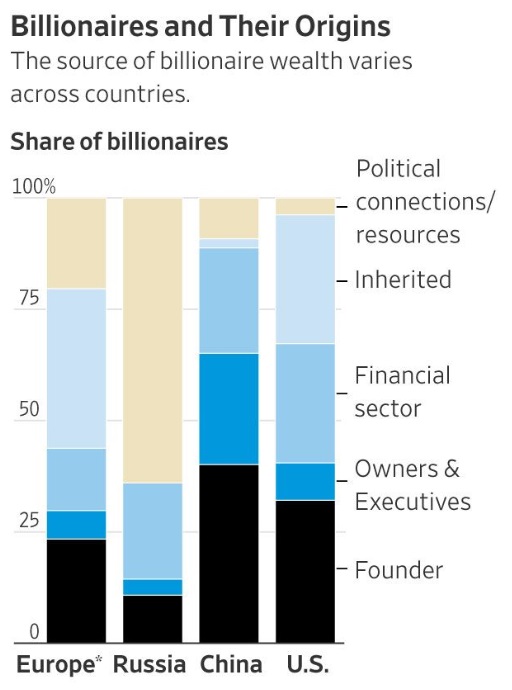Three years ago, I shared two charts, one from the Wall Street Journal and one from the Economist, showing how rich people became rich in various nations.
The main purpose of that column was to show – as depicted in the WSJ‘s chart -that cronyism was the main way that Russian billionaires amassed wealth, unlike in the United States.
And that led me to write that, “Russia’s ‘oligarchs’ are not like the self-made billionaires that we’re fortunate to have in the United States.”
Interestingly, the two charts showed that China’s billionaires did not rely on political connections.
But that didn’t seem right, So I wrote in a postscript that, “my gut instinct is that cronyism is a much bigger problem in China’s economy that we see in the data from the WSJ and the Economist.”
Well, my instincts may have been correct according a new article for Foreign Policy by James Palmer.
He starts by describing how attitudes toward wealth sort of changed after the horrors of Maoism.
…every billionaire’s fortune is built upon a thin foundation: the goodwill of the CCP. At every turn, the ultra-rich, especially since Xi took power, are reminded that their wealth exists at the sufferance of the party—and that it could all be taken away.
…Even after the abandonment of Maoism, the CCP has never been entirely comfortable with the wealthy. In the 1980s, Chinese leader Deng Xiaoping stated that it was fine for “a few” households and regions to “get rich first,” but he said it about peasants, not billionaires, and added that the rich had an obligation to lift up the poor. …Culturally, though, China embraced wealth from the 1980s on with the eagerness of a starving man falling on a banquet. …After two generations of deprivation and revolutionary austerity, the coming of money, and all the possibilities of money, seemed miraculous.
But Palmer explains that it is well nigh impossible to get rich in China without government favoritism in the beginning…or government exploitation later on (what could be called front-door cronyism or back-door cronyism).
In 2002, the CCP reversed its previous policy of shutting out entrepreneurs, who were previously seen as politically suspect. This didn’t lead to businesspeople flocking to the party but instead saw party members flowing into business, where their existing connections proved a serious advantage. Even as private initiative was celebrated, it depended on government backing. …The loans they needed…often came in turn from government-run banks, in a cycle of mutual profit. Officials welcomed GDP growth for their careers and bribes for themselves. …Yet unlike the legal firewalls and political pull enjoyed by U.S. billionaires, none of this success came with security. The newly wealthy were caught in a bind; their wealth let them buy off local officials, and eventually eclipse them, but as their fame grew, they attracted the attention of higher-ranking officials who demanded their own share of the pie. …It was impossible to rise cleanly: Even if your original business was honest, protecting it required not just bribery but participation in networks of mutual vice. …the authorities also regularly harvested them. Which billionaires fell was a matter of arrogance and chance… a ranking of the ultra-wealthy put together by British analyst Rupert Hoogewerf since 1999, became known as the “fattened pig list,” with the joke being that so many of its most prominent members were then picked for slaughter by the party.
Given some of his comments about billionaires in general, I think it’s safe to assume that the author is not a libertarian or conservative.
But he seems to recognize that America’s more laissez-faire approach is better than China’s government-centric approach.
In an era of unchecked billionaire power in the West, it might be tempting to think China has found a better way. But the tools of party power used against the ultra-wealthy are employed more frequently and more cruelly against the poor and powerless… And one class of the ultra-wealthy remains genuinely untouchable: the family members of party leaders. …the wealth of the party, like the power of the party, remains unquestioned.
I’ll close by once again stating that it is great that China engaged in partial economic reform starting more than 40 years ago. Severe poverty is no longer a problem and the nation’s economy is much bigger, which are impressive achievements.
But I’m worried about back-sliding toward more government (a global problem!). I very much hope that China engages in another wave of pro-market reform and can eventually join the club of rich, market-friendly countries.
P.S. Sadly (and unsurprisingly), the OECD and IMF are urging China to adopt bad policy.

No comments:
Post a Comment